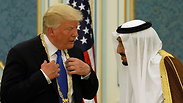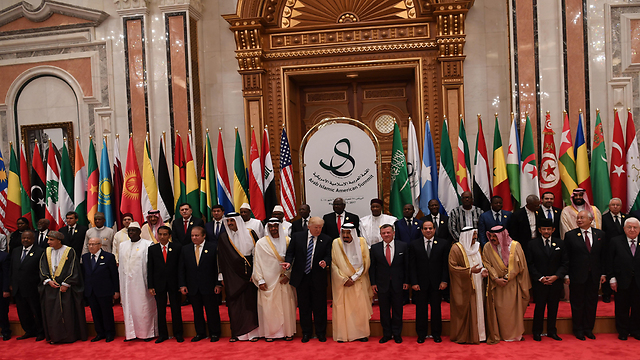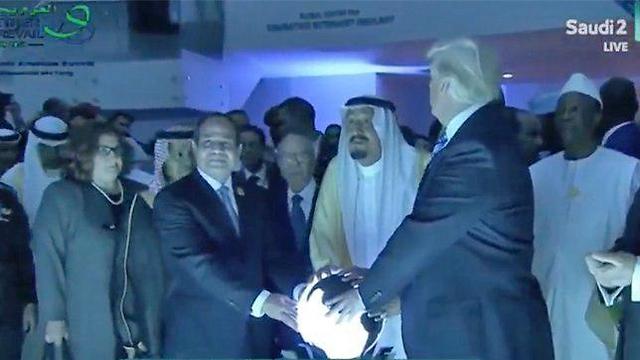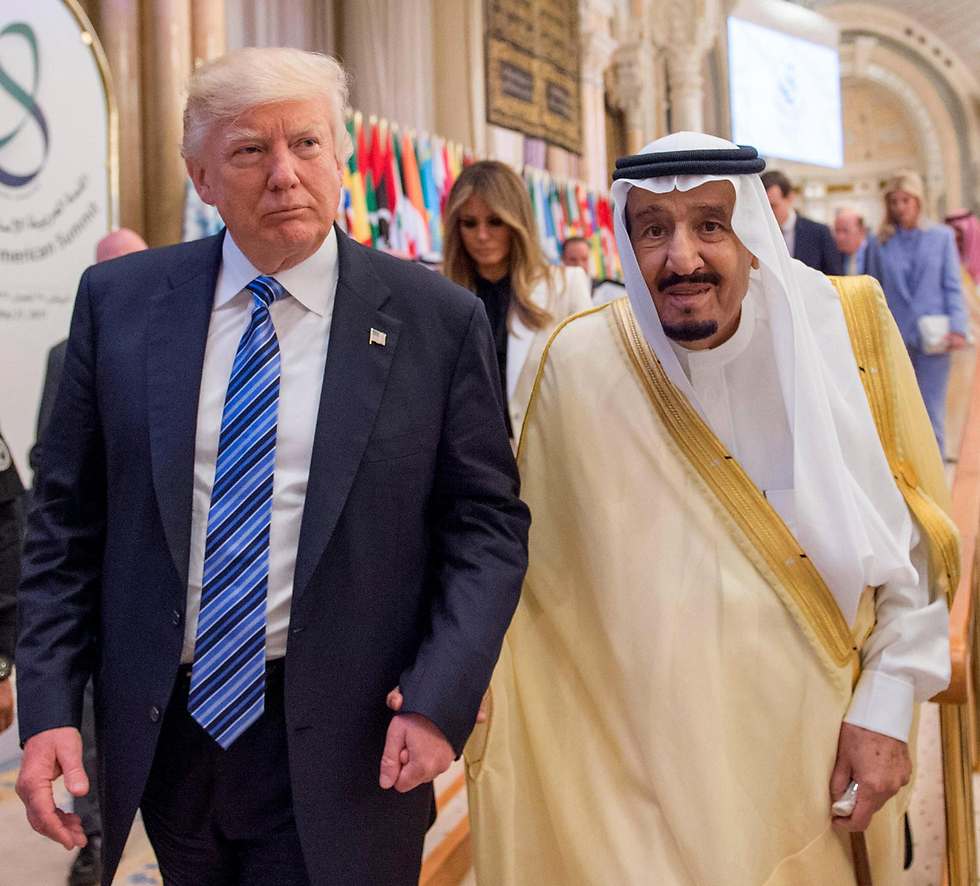
Can the Saudi weapons against Iran pose a threat to Israel?
During the Riyadh summit, attended by dozens of regional leaders and the US President, decisions were made pertaining to Iran and ISIS; In the long run, Israel should worry about the establishment of a large Arab force that might rise against it in an all-out war.
Despite the euphoria in Saudi Arabia following the new president's unreserved support for the Saudi kingdom and his clear stance against Iran, the figures in Israel do not bode well. We cannot expect a change in the Israeli-Palestinian relationship to enable the desired political breakthrough. Between chances and risks, war and peace, is there room for optimism?
Positive signs
Is Salman bin Abdulaziz, the Saudi king who came to power two and a half years ago, the harbinger of the upcoming peace? The Saudi peace proposal has already been laid in the early 2000s and soon it will be 20 years without the proposal having been implemented or seriously discussed by the parties. At the base of the proposal lies the principle of "full and complete peace": that is, Israel is supposed to give everything—to relinquish control of all territories taken over until 1967 and to provide a just solution to the Palestinian refugees, and in exchange, receive everything—complete normalization with the Arab world, whom Saudi Arabia purports to represent.
Ever since then, the common interests of Saudi Arabia and Israel have increased in strategic and economic terms. The revolutions in the Arab world highlighted Iran's efforts to increase its influence in the region as a Shiite power. Israel and Saudi Arabia have a common fear of Iran's rising power. Russia is an ally of Iran and also of the Syrian regime loyal to Iran. On the other hand, Israel and Saudi Arabia are the most important allies of the US in the region, strategically and economically, respectively. Israel and Saudi Arabia are threatened not only by the Shiite world and by the arms of Iran—Hezbollah and the Houthi rebels in Yemen—but also by the Sunni terrorist organizations—Hamas and ISIS.
In the closing photo of the Islamic summit, Saudi Arabia's King Salman was photographed alongside the leaders of Saudi Arabia's two closest neighbors—Jordan and Egypt—two countries that have peace treaties with Israel. Egyptian President Abdel Fattah al-Sisi stressed in his speech in Riyadh that the success of the struggle against terrorism depends, inter alia, on a solution to the Israeli-Palestinian conflict. Though King Salman did not explicitly speak of a peace proposal, he did stress the urgency of solving the Palestinian problem.
The summit was attended by 55 countries and Saudi Arabia emerged as the leader of the moderate Sunni world. Everything seems to be going well. But is that indeed the case?
Negative signs
The decisions reached during the Islamic summit are directed against Iran and against the terror of ISIS. Saudi Arabia has signed an unprecedented arms purchase deal with the US. The Islamic Summit will set up the "Middle East Strategic Coalition" next year with its headquarters in Riyadh, which will initially appoint 34,000 soldiers and be responsible for what is defined as the "beginning of peace" and "war on terrorism." This body will in fact be the direct continuation of the previous coalition set up by the Saudis to fight the Shiite Houthis in Yemen, who threaten the oil routes. The goals of the force may appear positive in the short term, but one never knows what the future will bring.
More than once, moderate Sunni states defined Israel's actions in the territories as "terrorist acts." It should be noted that in the previous times when a large Arab force was established, it led to an all-out war against Israel—the War of Independence, the Six-Day War and the Yom Kippur War. While conditions have changed since then, the situation in the Middle East is fluid and unpredictable.
Saudi Arabia is careful not to maintain public relations with Israel, and on the level of propaganda, Israel is portrayed by the clerics in the kingdom as negatively as Iran. This fact, together with the great power of clerics in the Saudi state established on the basis of the extremist Wahhabist ideology, casts doubt on the seriousness of the "full peace" proposal.
In addition, it was decided at the summit to establish a headquarters in Riyadh, in order to "fight extremism and encourage interfaith cooperation and tolerance." Can such a decision be taken seriously in a country where sharia law still prevails, where women are forbidden to drive, thieves have their hands cut off and executions are carried out in city squares?
Saudi Arabia does not admit to the fact that the fundamentalist ideology underlying al-Qaida and ISIS stemmed from them. Osama bin Laden, the arch-terrorist behind the September 11 terrorist attacks in the United States in 2001, and many of the leaders of ISIS, are from Saudi Arabia. To this day, Saudi clerics preach against the "infidel" West, and Saudi businessmen donate money to Islamic terror organizations and the Salafi movement, which aspires to re-establish the Muslim Khilafat. Taking all of this into account, the Riyadh summit's statement that "there is no connection between terrorism and religion" is particularly ridiculous.
At the Islamic conference, it was decided to set up another mechanism in Riyadh for terror-financed warfare. Can Saudi Arabia be trusted to implement this commitment after so many years funding all the fundamentalist organizations in the Middle East? Do not elements in the kingdom currently finance terrorist organizations in Syria? The Arab-Muslim leaders at the summit even formulated a joint statement that Saudi Arabia will help promote education and improve the economic situation in the countries participating in the conference, in order to keep youth away from the ignorance, poverty and unemployment that lead to terrorism.
Unlike the alliance between the US and Israel, the US-Saudi alliance is based on financial interests and Saudi oil. While Israel has shared values with the United States—democracy, tolerance and freedom of expression—Saudi Arabia has been and remains a dark fundamentalist religious kingdom which preaches daily against the West and the US in the mosques and the education system. This odd alliance persists as long as the kingdom continues to supply oil in large quantities and cheaply.
However, according to the Saudis, the "party" will end in 2030 as the kingdom's oil reserves are quickly depleting. Until that time, the Sunni kingdom is supposed to form a completely different financial plan based on different sectors, and not just on oil. Would 23 years suffice for Saudi Arabia to undergo a complete overhaul and thrust the kingdom's rich and spoiled youth into the labor market? What will happen when the oil runs out and Saudi Arabia will possess stockpiles of weapons and the US will have no economic interest in Saudi Arabia?
Is there room for optimism in Israel?
There seems to be little chance of renewing the Israeli-Palestinian negotiations at this time. In the Israeli government, the right-wing parties will topple the government if the prime minister raises the issue of progress in negotiations and handing over territories to the Palestinians. For a decade now, there has not been anything new on the Palestinian side, either. The internal Palestinian split is still going strong and there is no agreement between the Palestinian Authority in the West Bank and Hamas in the Gaza Strip on any issue, first and foremost on the issue of negotiations with Israel. Palestinian President Mahmoud Abbas cannot promise Israel peace with Gaza because he does not control it. Hamas will never be willing to recognize the PA's agreement with Israel on the basis of the 1967 borders because it has not changed its jihadist positions since its establishment 30 years ago.
Unfortunately, despite the Iranian threat shared by Israel and the Sunni world, the political conditions are even worse than during the Oslo Accords, because despite the flowery statements in the media, there is actually no desire or ability among the leaders of the parties to the Israeli-Palestinian conflict to reach an agreement.
Saudi Arabia's sponsorship cannot contribute to the advancement of peace, since the Saudi king who governs in the name of religion as "the servant of the two holy cities of Islam"—Mecca and Medina—can never give up Muslim sovereignty over the Temple Mount , the Al-Aqsa Mosque and the Dome of the Rock. Therefore, because of the decision of the Sunni axis to condition diplomatic progress on the pan-Arab level on progress in the Palestinian sphere, the Trump initiative is likely to fail like its predecessors—the Obama initiative, the Bush initiative, the Clinton initiative, etc.
Nevertheless, peace with Saudi Arabia could be a turning point in Israel's relations with the countries of the region. Perhaps against all odds, the very negotiations with the Palestinians could lead to a breakthrough with the Gulf States and Saudi Arabia. We must remember that the negotiations with the Palestinians during the Oslo process, which ultimately ended in failure, did enable the peace agreement with Jordan that was signed during the Oslo proceedings.
(Translated and edited by N. Elias)














